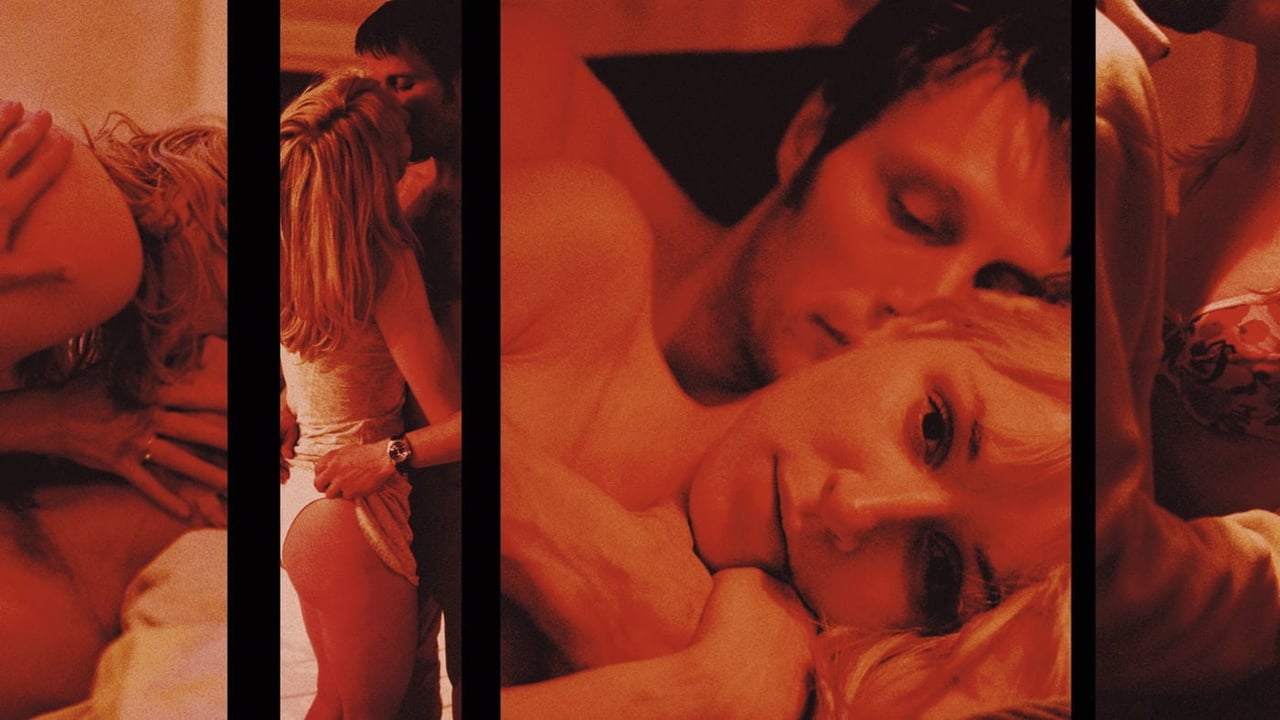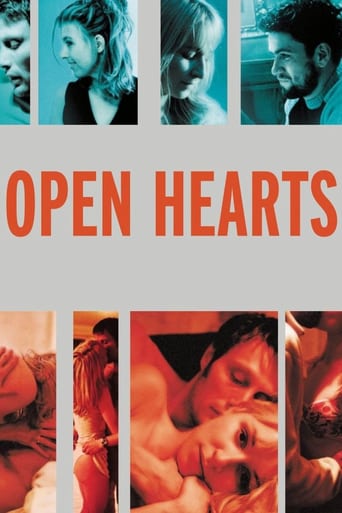Pacionsbo
Absolutely Fantastic
Huievest
Instead, you get a movie that's enjoyable enough, but leaves you feeling like it could have been much, much more.
Robert Joyner
The plot isn't so bad, but the pace of storytelling is too slow which makes people bored. Certain moments are so obvious and unnecessary for the main plot. I would've fast-forwarded those moments if it was an online streaming. The ending looks like implying a sequel, not sure if this movie will get one
Sarita Rafferty
There are moments that feel comical, some horrific, and some downright inspiring but the tonal shifts hardly matter as the end results come to a film that's perfect for this time.
Manal S.
I have seen so many Dogme films but I can wholeheartedly say that Open Hearts "Elsker dig for evigt" (2002) is my favorite and the closest to my heart.Cecilie (Sonja Ritcher) is a cook in her early twenties who is deeply in love with and also recently engaged to Joachim (Nikolaj Lie Kaas). Their relationship is put to test when Joachim becomes paralyzed for life after a car accident. The woman who was driving the car (Paprika Steen) feels obliged to help the couple and pushes her husband Niels (Mads Mikkelsen) to comfort Cecilie, unaware of the devastating outcome.. Niels falls in love with Cecilie.The thing about Dogme films is that they are capable of putting you in a very close position to the characters, almost in a crude way. Susanne Bier uses this honesty to gently place us inside the most closed space: the human psyche. Open Hearts does not just slam you with naked reality and intimate details - it does not want to shock you like most Dogme films, it takes you gently by the hand and allows you the same amount of confusion and indeterminateness the characters are feeling. And it does that equally; you can never blame any of the four protagonists even in their lowest moments because it is raw human emotions they are showing and simultaneously you are experiencing.The film could leave you melancholic or hopeful, it depends on how you see it, but what I am well sure of is that it will give you no closure, no answers, no relief of any kind - and this is so heartbreaking, just like life itself. It puts you in direct contact with the awful/beautiful fact that despite its intensity and realness sometimes, all the spectrum of human emotions is transient. My eyes teared up at the end of the film, not because I felt sorry for anyone or anything, but because I felt betrayed by the film's stark honesty. I wanted an ending to this emotional mess I have witnessed/experienced and instead I was left clueless and disillusioned in the middle of nowhere.Okay, enough with this subjective philosophical rambling. Let's talk about some technical aspects.Although Bier breaks away with some of the Dogme rules, I thought the use of Super-8 camera to show short fantasy sequences is a brilliant touch to take you a few steps away from reality and bring you even closer to the characters. Anders Thomas Jensen's script is gripping and flows effortlessly even when characters do not say a word, which leads us to the carefully chosen and amazing cast. I personally think that a great deal of the genius of the performance in this film comes from Bier herself and the kind of free yet intimate atmosphere she has provided for her actors. She does not aim at getting the best angles or making them look attractive, she only allows them the freedom to be themselves no matter how that would look like.
Sindre Kaspersen
Danish screenwriter, producer and director Susanne Bier's seventh feature film which was written by Danish screenwriter Anders Thomas Jensen, is based on an idea by Susanne Bier. It premiered at the 30th Norwegian International Film Festival Haugesund in 2002, was screened in the Contemporary World Cinema section at the 27th Toronto International Film Festival in 2002, in the Official Selection section at the 50th San Sebastián International Film Festival in 2002, was shot on location in Denmark and is a Danish production which was produced by Danish producer Vibeke Windeløv. It tells the story about a geography student named Joachim whom is going on a mountain climbing trip to Patagonia, South America and who on the day after having proposed to his 25-year-old girlfriend named Cæcilie who is a chef, is hit by a car and hospitalized. Whilst Cæcilie is waiting to see Joachim at the hospital, she is introduced to a doctor named Niels who lives in Copenhagen, Denmark with his wife named Marie and their 6-year-old son named Emil, 8-year-old son named Gustav and 14-year-old daughter named Stine who is in high school and who is having a fall out with her best friend regarding her boyfriend. Niels tells Cæcilie who he is and after talking with Marie who feels responsible for what has happened to Joachim, he begins spending time with Cæcilie.Distinctly and subtly directed by Nordic filmmaker Susanne Bier, this finely paced fictional tale which is narrated from multiple viewpoints, draws a profoundly heartrending portrayal of a Danish woman who goes out of her way to get her boyfriend to love her like he did before his accident, a Danish father and husband who instigated by his and his wife's consciousness makes himself available for her and a concerned daughter's relationship with her father. While notable for its distinct and naturalistic milieu depictions and fine cinematography by Danish cinematographer Morten Søborg, this dialog-driven and narrative-driven story about fate's intervention in the lives of ordinary people where a coincidental accident brings people together, separates them and affects each and every one of them and where human compassion leads to love and sorrow, depicts four humane and interrelated studies of character and contains a great and timely score by composer Jesper Winge Leisner. This sociological, at times humorous and utterly gripping drama from the early 2000s which is set in the capital city of Denmark in the early 21st century and where a daughter wonders why her father can buy a woman he has just met lots of furniture when he can't even buy her a dress, and a charming and lively man becomes an unrecognizable person after being paralysed from his neck and down, is impelled and reinforced by its cogent narrative structure, substantial character development, subtle continuity, natural and endearing characters, intimate realism, distinguishable depiction of interpersonal relations and the graciously heartfelt acting performances by Danish actors Mads Mikkelsen and Nikolaj Lie Kaas and Danish actresses Sonja Richter, Paprika Steen and Stine Bjerregaard in her debut feature film role. An acutely and gracefully romantic character piece which gained, among other awards, the Bodil Award for Best Danish Film at the 56th Bodil Awards in 2002.
dfwforeignbuff
Open Hearts (2002) Elsker Dig For Evigt. ("I'll Love You for Ever" or "Eternal Love" are better titles than "Open Hearts") Open Hearts (Danish: Elsker dig for evigt), (2002), is a gritty Danish drama directed by Susanne Bier using the minimalist film-making techniques of the Dogme 95 style. It stars Mads Mikkelsen, Nikolaj Lie Kaas, Sonja Richter and Paprika Steen. Also referred to as Dogme #28, Open Hearts relates the story of two young couples whose lives are traumatized by a tragic car accident and adultery. Cecilie is devastated when her fiancé Joachim is seriously injured in a car accident and is paralyzed from the waist down. She begins an affair with Niels, a doctor at the hospital where Joachim is being treated. Their relationship is further complicated by the fact that the doctor's wife Marie was the driver that caused the accident in the first place I have recently seen 2 of Susan Biers other films. I was not aware she had made a Dogma95 film. As I stated in reviews of her other films I am generally not a great fan of melodramas. I am a great fan of melodramas by Susan Bier. Her films make that magical transformation into REAL life (lives) and living (and dying). Open Hearts was filmed with video cameras--almost like the expert connoisseurs home movie. A young couple has plans for getting married. Joachim (Nikolaj Lie Kaas) and Cecilie (Sonja Richter) Fate intervenes when Joachim steps in from of a car (accidentally) and is hit and paralyzed never to walk again or movie his hands. Susan Biers films do not use sentimentality but go directly to the emotions of the human heart when dealing with her protagonists. Joachim does not accept his fate well- rejecting his girlfriend and hurling anger at all around him. The films craftsmanship is evident and honest emotions and interactions are tackled very directly by Bier. The film is emotionally dark and bleak look at the 2 main characters. Things go for even a more spin of fate as the girlfriend makes a strange involvement with the husband of the woman who actually caused the accident. the film streams on to its gut wrenching heart rendering end. There is a resolution of sorts and here at the very end the movie but that resolution was weak for me. I have put in my queue every film by Susan Bier. Highly Recommended--but be aware this is not general entertainment movie viewing. This movie will make you feel -think- cry and more. It is a very powerful film. hats off to Biers. Certainly one of the best films of 2002. Bier skillfully captures the feeling of real emotions that extreme trauma creates within the lives of the characters in her film. five stars highest recommendation.
jandesimpson
Let me stand and be counted! I cannot see the advantages in making a film the Dogme95 way. The negation of those basic elements developed over the years to enhance cinematic craftsmanship such as studio lighting and sets, background music and many facets of camera movements can only serve to restrict creative artistry and results in a careless look that is anathema to those who admire the skill with which the best films are made. I fail to see how Dogme differs from cinema verite other than placing further restrictions and demanding that the director conform to these before qualifying for a Dogme certificate. I would love to hear from those who think me wrong and misguided in order to gain some understanding of what it is all about. Having said this however I have to admit to being tremendously impressed by the Danish "Open Hearts", so much so that five minutes into the film I completely forgot the slapdash look of it all. Why? Because I was completely caught up in a tragically human situation and such perfect casting. Another fine recent film, "21 Grams", deals with the similar situation of the aftermath of a ghastly road accident and the way it affects the characters of those involved, but does so in a technically more conventional way. It says much for the Danish film that it almost emerges as the more powerful work. Perhaps Dogme has no case to answer after all!

